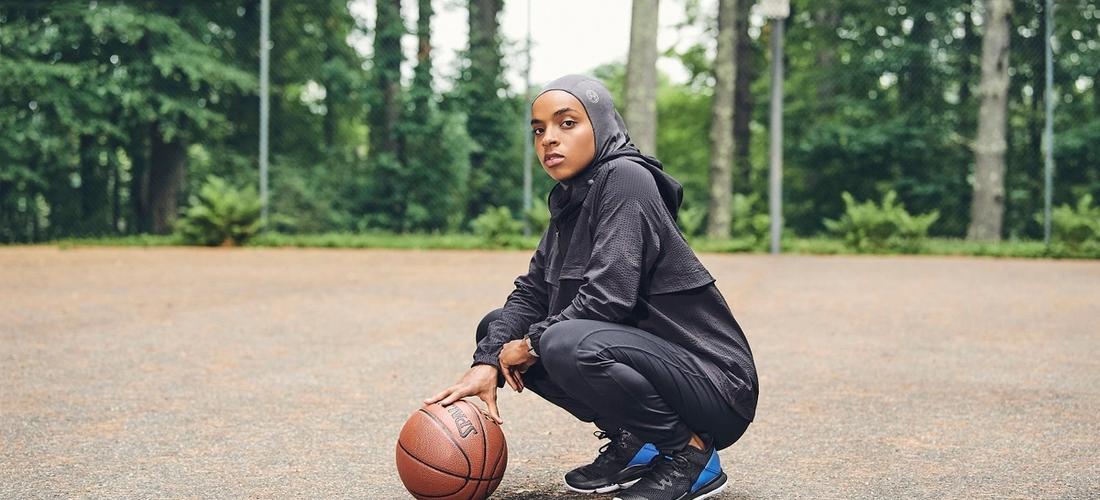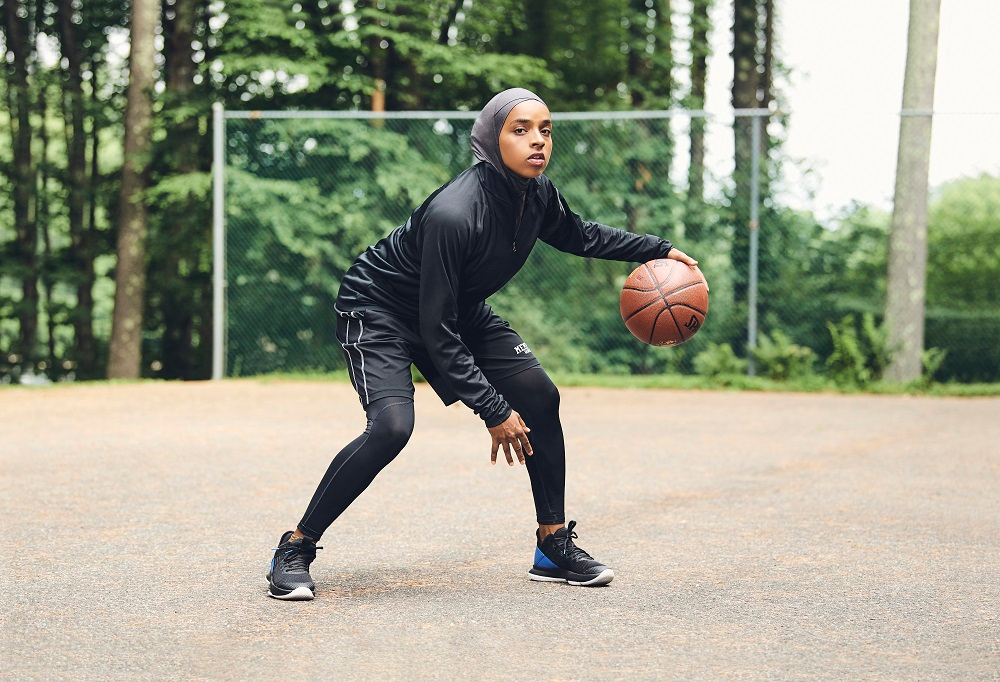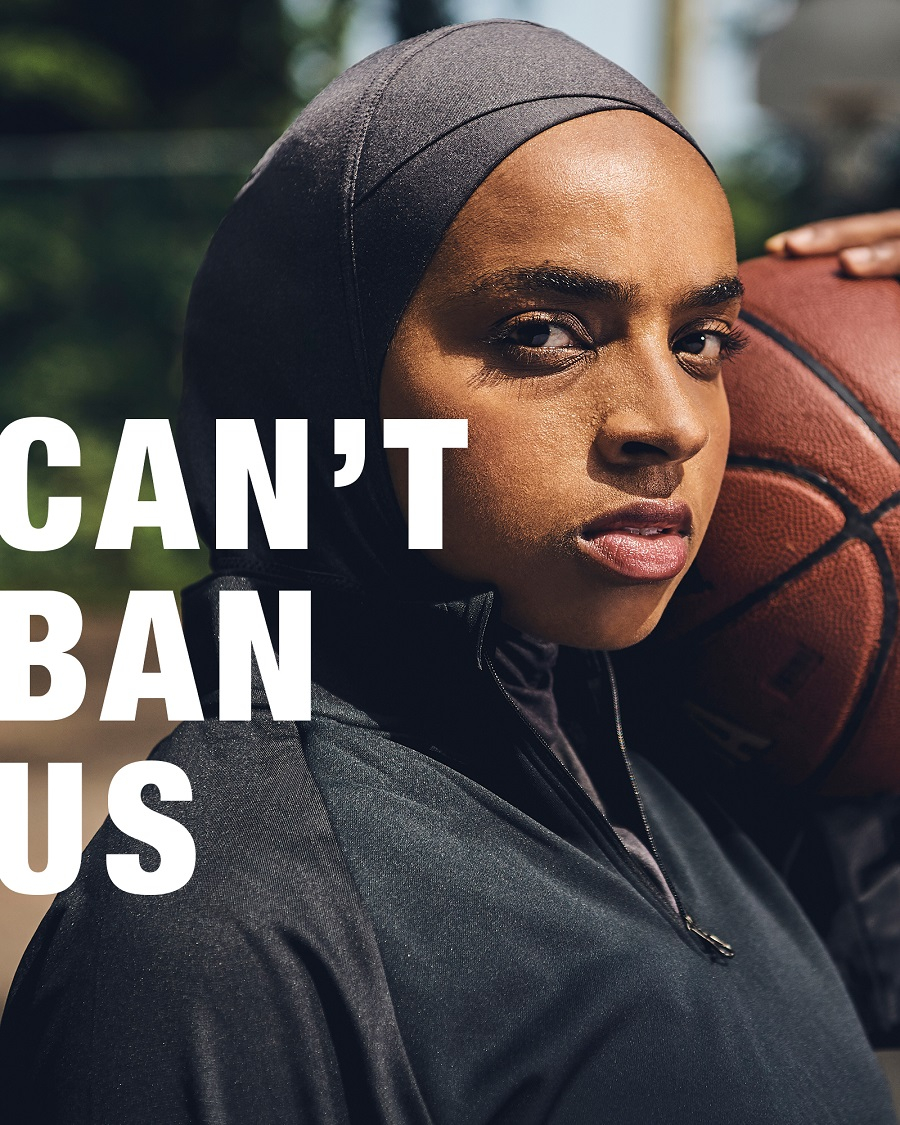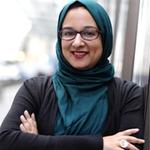Basketballer Bilqis Abdul-Qaadir Never Took No for an Answer. You Shouldn't Either.
Community
|
Sep 22, 2020
|
8 MIN READ

Bilqis Abdul-Qaadir
When she was forced to choose between faith and sport, basketball player Bilqis Abdul-Qaadir chose Islam. She chose her hijab, which was integral to her identity as a Muslim and her faith practices. It was an agonizing choice, but in a way, there was no choice to make.
Bilqis had phenomenal stats as a top-ranked high school basketball player throughout high school and college, so naturally she had her eyes on entering the WNBA. But when Bilqis, who had always played wearing leggings or tights underneath her shorts, a long-sleeved shirt underneath her jersey and her hair covered, was forced to choose between faith and basketball, it wasn't much of a choice. When she didn’t make it into the WNBA in 2014, she decided to aim for international play only to be banned from that when she learned that the International Basketball Federation (FIBA) didn’t allow headgear, including her hijab.
When the FIBA ban came out, “I remember crying and feeling like I lost a sense of direction. It was as if I’d put all my eggs in one basket because basketball was something I always knew that I was going to do, and I had to re-identify who I was after the ban,” she says. “Basketball was IT for me. ... That was the first time I felt like I actually prayed for a reason, and felt the real need to really connect with Allah (S).” Bilqis joined the #FIBAAllowHijab campaign, and by 2017, the federation changed its rules to allow head coverings in international competition. By that time and after additional training, however, Bilqis decided to move on from professional play believing she’d have more impact off the court than on.
I spoke with Bilqis, who is our new Haute Hijab Sport Ambassador, about why she is so deeply angry about hijab and religious clothing bans in sports, how motherhood has deepened her appreciation for basketball and bouncing back after life losses, what it means to be an athlete activist and what all young women need to know.
How is sports a power for positivity in your life and for others in their interactions with you?
Many times my presence on different courts gave people the opportunity to see and meet a Muslim for the first time. In a way, that was tough because I had to be that example and make that first good impression and to break the stereotypes. Basketball was something that taught me basic life principles, like resilience, discipline and focus. It taught me how to motivate myself, how to be a leader and how to be a team player early on.
I think the beauty of sport, in general, is that it teaches you so many life values and positive characteristics that correlate with Islam. Early on as a Muslim, you might not understand those values unless they are practical. So, having basketball helped me balance out Islam and understand a lot of different things as far as acting like a Muslim goes.
How did the FIBA ban, which squashed your chances of playing basketball internationally, affect your faith and identity?
When the FIBA ban came out, I remember crying and feeling like I lost a sense of direction. It was as if I'd put all my eggs in one basket, because basketball was something I always knew that I was going to do, and I had to re-identify who I was after the ban. Basketball was it for me. Basketball was IT. I had to figure things out fairly quickly. That was the first time I felt like I actually prayed for a reason and felt the real need to really connect with Allah (S).
It was a year span where I went through a mini-depression. I never felt those feelings before, and there was no basketball. I couldn't go to the court; well, I could've but that wasn't fulfilling, and it wasn't helping with those feelings. So I turned to prayer, and I remember feeling prayer for the first time in my life. As women, we can be so caught up with trying to fit into the image of someone else or be someone we're not that we get lost. If we find that self-confidence, motivation and inspiration within ourselves early on, I think that a lot of our young women would be more comfortable with ourselves.

At that moment I just started to feel little changes in my faith. Then, Hussein, one of the Abdullah brothers [who played in the NFL], randomly messaged me on Instagram and invited me to a conference in LA for Muslims who were in the spotlight. At first, I wasn't sure If I was going to be able to make it, but he insisted. So I went, and that's where I truly found Islam in my heart. I shared things that I'd never shared with my family, with people I didn’t know.
I opened up about things like questioning Islam and questioning taking off my hijab – and I had never expressed those things to anybody. I shocked myself and Alhamdullilah, the way Allah (S) works is just crazy. It's a feeling that I can't describe. I felt like I became Muslim at that moment.
How did you move from being a basketball player to an athlete activist?
There was a time when I was thinking selfishly – that if I can't play, then it's done. I didn't want to fight this anymore. But as I was going through the process, random Muslim girls from all over the world were tagging me in pictures and sending me DM's, and they all look just like me. They're trying to play basketball, they're trying to learn, and I realized, "Man, this is not about me anymore."
Because sport is so universal and athletes can make so much change, I began thinking about the bigger picture. This can change for the greater good. And how it all unraveled, just with Muslim women in sports in general over the past few years and [when] the FIBA ban hit the news, you saw so many women athletes taking a stand. In a way, it stems from me trying to play pro basketball in hijab. And so I stepped into that place as an athlete activist, if that's what you want to call it. It's bigger than me and at this point, it's bigger than basketball.
When FIBA changed its rules to allow head coverings, you had been training for three years but ultimately decided not to jump back into the court. What led to that decision?
When FIBA announced the rule change [in 2017], I was completely torn. It was a bittersweet moment, because I was happy to be a part of change. But on the other hand, they took too long. At the time, I had just jumped into my first career job as an athletic director, and I was also traveling across the globe for speaking engagements and hosting basketball camps and clinics. The decision not to play was the most difficult decision I’d ever made.
What ultimately led to me choosing to hang up the kicks was weighing out if I’d have a greater impact on or off the court; in that moment, I believe I was doing more good for others off the court. I was able to connect deeply with Muslim women and girls through lectures, talks and basketball programs.
Tell us about Dribbling Down Barriers, the program you started with your husband A.W. Massey. What does the program do?
Dribbling Down Barriers is a sports development program that uses basketball as a tool to help our youth understand the importance of togetherness, self-esteem, confidence, mental and physical strength. It’s a program that brings people from all walks of life together and teaches them acceptance, inclusion, and love by building bridges instead of barriers.
You recently also had a baby! How has motherhood impacted your hoop life? What would you like to impart to your son from your commitment to sport and basketball?
Man, being a mother is so weird. I’ve learned so much about myself, my body and what’s it like to sacrifice every part of your being for a little human you barely know. Motherhood is about accepting every change that happens to you mentally and physically. It’s also about remembering who you are, aside from being a mother.
I’m honestly grateful for basketball because now it’s my way of getting back in shape postpartum. My husband is a well-known coach and trainer back in his hometown, and he is now my trainer! His motivation and push during our training sessions is going to drive me where I want and need to be. My husband always says, “If you want to play again, all you have to do is tell me.” Who knows?
I want my son, Azyaan, to learn discipline and resilience. Even if he’s not a baller, I want him to know and understand that in life, he’ll fail more times than he’ll succeed. He’ll be dismissed more times than being accepted. Regardless though, it’s about how he bounces back after those life losses. What I learned through ball is that as long as you know how to dribble and maneuver through your defense, the ball always bounces back; same in life.

What drew you to working with Haute Hijab on this HH Sport?
Melanie, is a boss! Masha’Allah. I’ve been following her for years and met her husband back when HH was on the come up. I’ve tried out many sport hijabs, even the mainstream brands, and I’ve really only found one that I like. When HH reached about their sport hijab line, there was no way I could say no. I knew it was going to be legit, Masha’Allah!
What were your challenges or frustrations around hijab and sport/fitness?
Early on, around 2004, when I first started wearing hijab, there was nothing but a two-piece hijab. The material was trash, it was too hot, and all hijabis know how we feel about the two-piece! I ended up tying an old piece of material in a turban style, and that was my look through high school and college ball. I do believe that after my situation with FIBA surfaced in the media, companies started popping up with sport hijabs; especially big name brands.
What kind of sports hijab from Haute Hijab Sport do you prefer the most and why?
I honestly enjoyed all of them but, the Criss-Cross hijab, was my favorite. Super comfortable, accentuated my face and made me feel good and look fierce.
We’re so excited to have you as one of the athletes for Haute Hijab Sport! What message would you like to share with other young Muslim women athletes?
I want our Muslim women to know that as athletes, we are walking dawah. When we hit the playing fields, gyms, or arenas, people see us. People may stare in awe, people may look and laugh, and some people may want to just know, why? At the end of the day, we are spreading the beauty of Islam by pursuing our passions, staying healthy and breaking down barriers.
Figure out who you are at an earlier point in life, and don't worry about what other people think. Do things for the sake of Allah (S), and when you do it for Him, things become so much easier. You're not here to please people. As women, I feel like we can be so caught up with trying to fit with the image of somebody else or things that we see or be somebody we're not, that we get lost. And, I truly believe that if we find that self-confidence, motivation and inspiration within ourselves early on, a lot of our young women – Muslim or non-Muslim – would be more comfortable with ourselves.
And never take no for an answer.
Find Bilqis on Instagram: @qis_mo and @muslimgirlshooptoo and on Twitter: @bilqis_abdulq
Subscribe to be the first to know about new product releases, styling ideas and more.
What products are you interested in?

